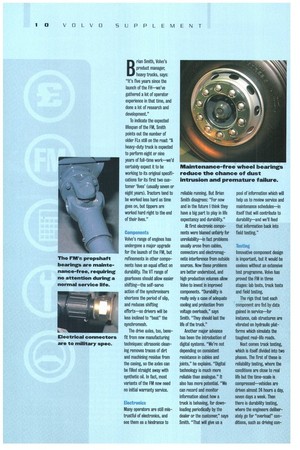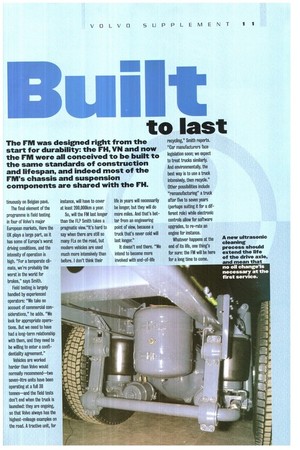B rian Smith, Volvo's product manager, heavy trucks, says: "It's five
Page 114

Page 115

If you've noticed an error in this article please click here to report it so we can fix it.
years since the launch of the FH—we've gathered a lot of operator experience in that time, and done a lot of research and development."
To indicate the expected lifespan of the FM, Smith points out the number of older FLs still on the road: "A heavy-duty truck is expected to perform eight or nine years of full-time work—we'd certainly expect it to be working to its original specifications for its first two customer 'lives' (usually seven or eight years). Tractors tend to be worked less hard as time goes on, but tippers are worked hard right to the end of their lives."
Components Volvo's range of engines has undergone a major upgrade for the launch of the FM, but refinements in other components have an equal effect on durability. The VT range of gearboxes should allow easier shifting—the self-servo action of the synchronisers shortens the period of slip, and reduces shifting efforts—so drivers will be less inclined to "beat" the synchromesh.
The drive axles, too, benefit from new manufacturing techniques: ultrasonic cleaning removes traces of dirt and machining residue from the casing, so the axles can be filled straight away with synthetic oil. In fact, most variants of the FM now need no initial warranty service.
Electronics Many operators are still mistrustful of electronics, and see them as a hindrance to reliable running. But Brian Smith disagrees: "For now and in the future I think they have a big part to play in life expectancy and durability."
At first electronic components were blamed unfairly for unreliability—in fact problems usually arose from cables, connectors and electromagnetic interference from outside sources. Now these problems are better understood, and high production volumes allow Volvo to invest in improved components. "Durability is really only a case of adequate cooling and protection from voltage overloads," says Smith. "They should last the life of the truck."
Another major advance has been the introduction of digital systems. "We're not depending on consistent resistance in cables and joints," he explains. "Digital technology is much more reliable than analogue." It also has more potential. "We can record and monitor information about how a truck is behaving, for downloading periodically by the dealer or the customer," says Smith. "That will give us a pool of information which will help us to review service and maintenance schedules—in itself that will contribute to durability—and we'll feed that information back into field testing."
Testing Innovative component design is important, but it would be useless without an extensive test programme. Volvo has proved the FM in three stages: lab tests, track tests and field testing.
The rigs that test each component are fed by data gained in service—kw instance, cab structures are vibrated on hydraulic platforms which simulate the toughest real-life roads.
Next comes track testing, which is itself divided into two phases. The first of these is reliability testing, where the conditions are close to real life but the time-scale is compressed—vehicles are driven almost 24 hours a day, seven days a week. Then there is durability testing, where the engineers deliberately go for "overload" conditions, such as driving con tinuously on Belgian pave.
The final element of the programme is field testing in four of Volvo's major European markets, Here the UK plays a large part, as it has some of Europe's worst driving conditions, and the intensity of operation is high. "For a temperate climate, we're probably the worst in the world for brakes," says Smith.
Field testing is largely handled by experienced operators: "We take no account of commercial considerations," he adds. "We look for appropriate operations. But we need to have had a long-term relationship with them, and they need to be willing to enter a confidentiality agreement," Vehicles are worked harder than Volvo would normally recommend—two seven-litre units have been operating at a full 38 tonnes—and the field tests don't end when the truck is launched: they are ongoing, so that Volvo always has the highest-mileage examples on the road. A tractive unit, for instance, will have to cover at least 200.000km a year.
So, will the FM last longer than the FL? Smith takes a pragmatic view."It's hard to say when there are still so many FLs on the road, but modern vehicles are used much more intensively than before. I don't think their life in years will necessarily be longer, but they will do more miles. And that's better from an engineering point of view, because a truck that's never cold will last longer."
It doesn't end there. "We intend to become more involved with end-of-life recycling," Smith reports. "Car manufacturers face legislation soon; we expect to treat trucks similarly. And environmentally, the best way is to use a truck intensively, then recycle." Other possibilities include "remanufacturing" a truck after five to seven years (perhaps suiting it for a different role) while electronic controls allow for software upgrades, to re-rate an engine for instance.
Whatever happens at the end of its life, one thing's for sure: the FM will be here for a long time to come.




















































































































